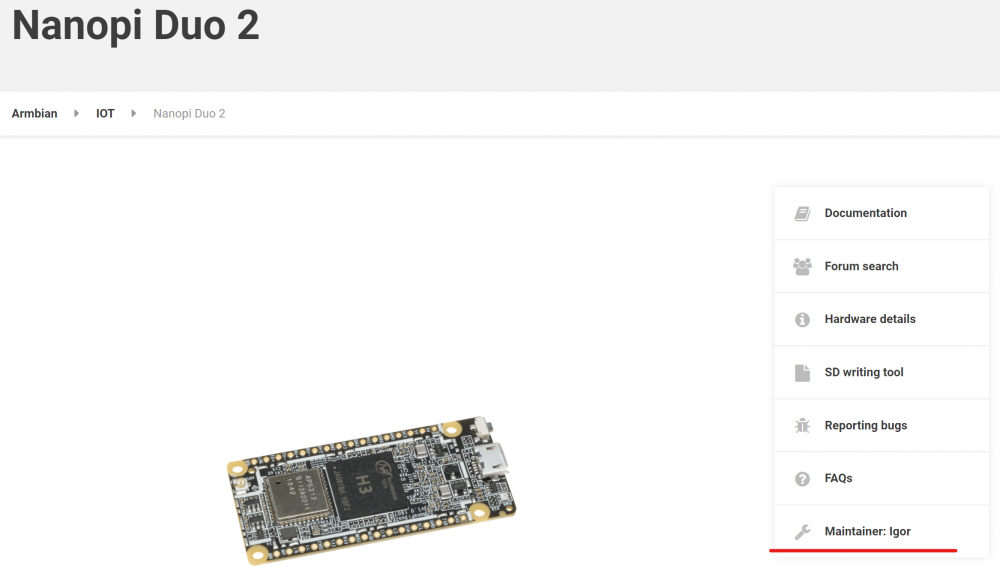-
Posts
17 -
Joined
-
Last visited
Recent Profile Visitors
1123 profile views
-

Armbian with preinstalled Home Assistant supervised
Slawek replied to Igor's topic in Software, Applications, Userspace
Hi @Igor, many hanks for the HA version on Armbian - mine works perfectly on Odroid N2+ eMMC. As my eMMC is only 32GB, so I want to move datadisk to external USB SSD drive. Do you have any experience with this operation. Built-in HA feature does not work. CLI operation reports Error: 'DataDisk.migrate_disk' blocked from execution, no Home Assistant OS available. Probably due to different mount/folder structure. Any suggestions will be very welcome... Best regards Slawek -
-
Hello, the Nanopi DUO 2 has marked igor as a maintainer but the download section is empty. It's the board removed from support or maybe there is some small bug on portal? best regards Slawek
-
Hi @cusna ! Did you manage to get it working ? I'm trying to have this same functionality on my NanoPi Duo - only difference is pin number - PG11 - still no success. Long week of digging in DT docs and internet resource and I'm still "thick as a brick"
-
Hi @lex, many thanks for you effort. Finally I have it working.... but it was made .... automagically by installing new Armbian from this Tuesday 21'th (Armbian_5.59_Nanopiduo_Ubuntu_bionic_next_4.14.65.img or Armbian_5.59_Nanopiduo_Debian_stretch_next_4.14.65.img - both are working perfectly) The routing table is set after connection exactly this same as it was in Raspbian on my RPi3. I don't know what was the source of problems but now is working OK, so we can close the topic. BTW: there was no success with manual altering of route table on previous Armbian tested.
-
Thanks for your suggestion. Here are results: NanoPi Duo (Armbian_5.38_Nanopiduo_Debian_stretch_next_4.14.15.img) before connection: root@nanopiduo:~# route Kernel IP routing table Destination Gateway Genmask Flags Metric Ref Use Iface default 0.0.0.0 0.0.0.0 U 1002 0 0 eth0 link-local 0.0.0.0 255.255.0.0 U 0 0 0 eth0 root@nanopiduo:~# ip route default dev eth0 scope link metric 1002 linkdown 169.254.0.0/16 dev eth0 proto kernel scope link src 169.254.11.58 linkdown after connection: CONNECT --> Carrier detected. Starting PPP immediately. --> Starting pppd at Thu Aug 23 18:52:19 2018 --> Pid of pppd: 1099 --> Using interface ppp0 --> local IP address 10.91.179.3 --> remote IP address 10.64.64.64 --> primary DNS address 194.204.159.1 --> secondary DNS address 194.204.152.34 root@nanopiduo:~# route Kernel IP routing table Destination Gateway Genmask Flags Metric Ref Use Iface default 0.0.0.0 0.0.0.0 U 1002 0 0 eth0 10.64.64.64 0.0.0.0 255.255.255.255 UH 0 0 0 ppp0 link-local 0.0.0.0 255.255.0.0 U 0 0 0 eth0 root@nanopiduo:~# root@nanopiduo:~# ip route default dev eth0 scope link metric 1002 linkdown 10.64.64.64 dev ppp0 proto kernel scope link src 10.95.40.137 169.254.0.0/16 dev eth0 proto kernel scope link src 169.254.11.58 linkdown results of ping: root@nanopiduo:~# ping 8.8.8.8 PING 8.8.8.8 (8.8.8.8) 56(84) bytes of data. From 169.254.10.53 icmp_seq=1 Destination Host Unreachable From 169.254.10.53 icmp_seq=2 Destination Host Unreachable From 169.254.10.53 icmp_seq=3 Destination Host Unreachable ^C --- 8.8.8.8 ping statistics --- 6 packets transmitted, 0 received, +3 errors, 100% packet loss, time 5193ms pipe 4 root@nanopiduo:~# ping -I ppp0 8.8.8.8 PING 8.8.8.8 (8.8.8.8) from 10.91.179.3 ppp0: 56(84) bytes of data. 64 bytes from 8.8.8.8: icmp_seq=2 ttl=118 time=639 ms 64 bytes from 8.8.8.8: icmp_seq=3 ttl=118 time=1108 ms 64 bytes from 8.8.8.8: icmp_seq=4 ttl=118 time=225 ms ^C --- 8.8.8.8 ping statistics --- 11 packets transmitted, 3 received, 72% packet loss, time 10434ms rtt min/avg/max/mdev = 225.175/657.813/1108.846/360.991 ms, pipe 2 RPi 3 (2018-06-27-raspbian-stretch-lite.img) Before connection route table is empty. After connection: root@nanopiduo:~# route Kernel IP routing table Destination Gateway Genmask Flags Metric Ref Use Iface default 0.0.0.0 0.0.0.0 U 0 0 0 ppp0 10.64.64.64 0.0.0.0 255.255.255.255 UH 0 0 0 ppp0 root@nanopiduo:~# ip route default dev ppp0 scope link 10.64.64.64 dev ppp0 proto kernel scope link src 10.90.159.69 and ping is working nice and smooth: PING 8.8.8.8 (8.8.8.8) 56(84) bytes of data. 64 bytes from 8.8.8.8: icmp_seq=1 ttl=117 time=134 ms 64 bytes from 8.8.8.8: icmp_seq=2 ttl=117 time=45.7 ms 64 bytes from 8.8.8.8: icmp_seq=3 ttl=117 time=40.4 ms 64 bytes from 8.8.8.8: icmp_seq=4 ttl=117 time=43.8 ms 64 bytes from 8.8.8.8: icmp_seq=5 ttl=117 time=43.8 ms --- 8.8.8.8 ping statistics --- 5 packets transmitted, 5 received, 0% packet loss, time 4008ms rtt min/avg/max/mdev = 40.454/61.783/134.997/36.647 ms Seams that on Armbian the default and link-local are bind to eth0 but on RPi to ppp0. Could be the source of my problems? Both installations are super fresh - just images flashed to SD on NPi USB_Modeswitch installed (o raspbian is included in distro) plus on both on RPi wvdial installed and configured. Nothing else.
-
Hi, I'm trying to use the popular LTE USB modem Huawei E3372s (Stick mode) with NanoPi Duo. Modem is in Network card mode - USB_Modeswitch was installed and started root@nanopiduo:~# lsusb Bus 006 Device 001: ID 1d6b:0001 Linux Foundation 1.1 root hub Bus 004 Device 002: ID 0525:a4a7 Netchip Technology, Inc. Linux-USB Serial Gadget (CDC ACM mode) Bus 004 Device 001: ID 1d6b:0002 Linux Foundation 2.0 root hub Bus 005 Device 001: ID 1d6b:0001 Linux Foundation 1.1 root hub Bus 003 Device 003: ID 12d1:1506 Huawei Technologies Co., Ltd. Modem/Networkcard Bus 003 Device 001: ID 1d6b:0002 Linux Foundation 2.0 root hub Bus 002 Device 001: ID 1d6b:0001 Linux Foundation 1.1 root hub Bus 001 Device 001: ID 1d6b:0002 Linux Foundation 2.0 root hub WVDial is installed and configured: /etc/wvdial.conf [Dialer Orange] Modem = /dev/ttyUSB1 Init3 = AT+CGDCONT=1,"IP","internet" Username = "internet" Password = "internet" Phone = "*99#" Dial Command = ATDTW Stupid Mode = yes Dial Attempts = 0 the connection to my provider is going fine: root@nanopiduo:~# wvdial orange& [1] 2752 root@nanopiduo:~# --> WvDial: Internet dialer version 1.61 --> Initializing modem. --> Sending: ATZ ATZ OK --> Sending: ATQ0 V1 E1 S0=0 ATQ0 V1 E1 S0=0 OK --> Sending: AT+CGDCONT=1,"IP","internet" AT+CGDCONT=1,"IP","internet" OK --> Modem initialized. --> Sending: ATDTW*99# --> Waiting for carrier. ATDTW*99# CONNECT --> Carrier detected. Starting PPP immediately. --> Starting pppd at Mon Jan 29 06:38:27 2018 --> Pid of pppd: 2753 --> Using interface ppp0 --> local IP address 10.89.114.208 --> remote IP address 10.64.64.64 --> primary DNS address 194.204.159.1 --> secondary DNS address 194.204.152.34 root@nanopiduo:~# ifconfig eth0: flags=4099<UP,BROADCAST,MULTICAST> mtu 1500 ether b2:9b:24:4e:11:e2 txqueuelen 1000 (Ethernet) RX packets 0 bytes 0 (0.0 B) RX errors 0 dropped 0 overruns 0 frame 0 TX packets 0 bytes 0 (0.0 B) TX errors 0 dropped 0 overruns 0 carrier 0 collisions 0 device interrupt 35 lo: flags=73<UP,LOOPBACK,RUNNING> mtu 65536 inet 127.0.0.1 netmask 255.0.0.0 inet6 ::1 prefixlen 128 scopeid 0x10<host> loop txqueuelen 1000 (Local Loopback) RX packets 64 bytes 5184 (5.0 KiB) RX errors 0 dropped 0 overruns 0 frame 0 TX packets 64 bytes 5184 (5.0 KiB) TX errors 0 dropped 0 overruns 0 carrier 0 collisions 0 ppp0: flags=4305<UP,POINTOPOINT,RUNNING,NOARP,MULTICAST> mtu 1500 inet 10.93.28.221 netmask 255.255.255.255 destination 10.64.64.64 ppp txqueuelen 3 (Point-to-Point Protocol) RX packets 7 bytes 106 (106.0 B) RX errors 0 dropped 0 overruns 0 frame 0 TX packets 8 bytes 157 (157.0 B) TX errors 0 dropped 0 overruns 0 carrier 0 collisions 0 wlan0: flags=4099<UP,BROADCAST,MULTICAST> mtu 1500 ether 12:42:33:5d:22:81 txqueuelen 1000 (Ethernet) RX packets 0 bytes 0 (0.0 B) RX errors 0 dropped 0 overruns 0 frame 0 TX packets 0 bytes 0 (0.0 B) TX errors 0 dropped 0 overruns 0 carrier 0 collisions 0 but I can't ping nothing on the Internet: root@nanopiduo:~# ping 8.8.8.8 PING 8.8.8.8 (8.8.8.8) 56(84) bytes of data. ^C --- 8.8.8.8 ping statistics --- 8 packets transmitted, 0 received, 100% packet loss, time 7254ms The modem (E3372s) with RPi 3 and latest Raspbian works perfectly. Also plugged into my Windows 10 PC works OK. Nano Pi Duo is powered from good 3A 5V power source and USB socket for Huawei 3371s is separately powered from this same source (not via pins on Nano Pi Duo). checked with: Armbian_5.38_Nanopiduo_Debian_stretch_next_4.14.15, Armbian_5.38_Nanopiduo_Ubuntu_xenial_next_4.14.15.img and also with nanopi-duo_friendlycore-xenial_4.14.52_20180628.img. If you have any idea what should I check any suggestions will be very appreciated. Slawek
-
Hi hi hi, the answer is simple. Just because I have few NanoPi NEO flying on my desk, I used them for other project - this with X11 Forwarding and Lazarus if you remember. And of course NanoPi NEO has no CSI socket. BTW I'm using the 256Kb version for OctoPrint, and is doing his job without any problems ;-) I haven't tested direct slicing on NanoPi with Cura, but personally I prefer doing this job on PC and just transfer GCode to OctoPrint.
-
I'm really sorry, I'm an idiot ! Seems that there are two "standards" for USB data cable colours: Green ->D+ White->D- and opposite. After quick "multimeter" investigation I realised that I have cable with other version that I assumed. Every three USB's are working perfectly. Sorry again for wasting your time.
-
Thanks, seams that my problem is somewhere else. I have my NanoPi NEO used as OctoPrint server for my 3D printer (RUMBA board). I would like to use the ports USB1/USB2 for connecting the usb web camera and RUMBA board itself, leaving the USB3 for other tasks - for example WiFi dongle. When the RUMBA is connected to USB3 the /dev/ttyACM0 is automatically created, but when RUMBA is connected to USB1 nothing happen. I'm quite sure that I soldered the USB cables properly. Any idea? Maybe some configuration is necessary? BTW NanoPi NEO works perfectly as OctoPrint server - and is really small.
-
Hi, on my NanoPi NEO with Armbian_5.20_Nanopineo_Debian_jessie_3.4.112.img I would like to enable USB1 and USB2. Following the guide https://docs.armbian.com/Hardware_Allwinner/ I have the fex file ready for edit. But I'm not sure what values I have to enter into [usbc1], [usbc2] section. Maybe you have ready to use values or you can push me in good direction, where to find for example port:PG?? port:PL?? for USB1 and USB2 on NanoPI NEO board. regards, Slawek
-
Hi hi hi you are absolutely right. But you know .... Never look a gift-horse in the mouth.
-
What do you mean?
-
Hi, finally I have tested my NanoPi NEO with X11 Forwarding. It was simpler than I was expecting. My steps to have X11 forwarding on "headless" NanoPi NEO to my desktop Win10 machine Install and configure Xming X Window System on PC Setup SSH Terminal access with X11 forwarding in my case PuTTY Check sshd_config file according to this guide http://www.straightrunning.com/XmingNotes/trouble.php /etc/ssh/sshd_config X11Forwarding yes X11DisplayOffset 10 X11UseLocalhost yes XAuthLocation /usr/bin/X11/xauth AddressFamily inet Install Xorg: apt-get install xorg reboot You just can test the X11 forwarding running for example xclock or gterm from terminal window. It works with all images "stock one" and armbian's Debian and Ubuntu. Now I have Freepascal/Lazarus installed on my NanoPi NEO. It works on 512MB and 256MB version !!! Wow. Now it's time to start programming ....



